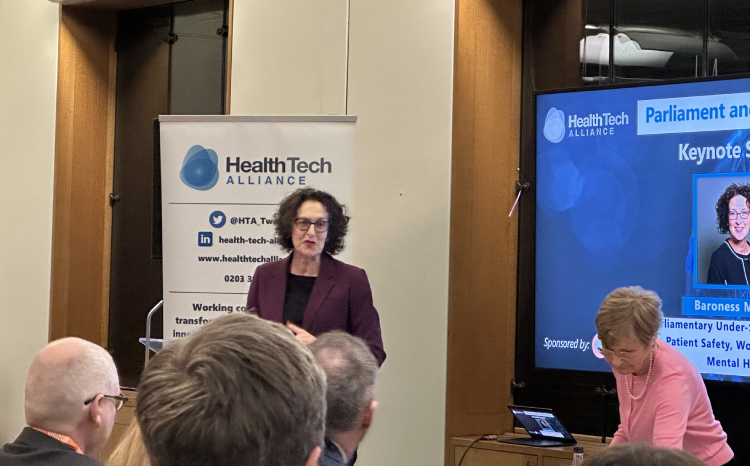HealthTech is the UK’s hidden gem – the government can’t ignore it
- 2 April 2025

A targeted focus on HealthTech has the potential to boost the UK’s global competitiveness, writes Russ Shaw, founder of Tech London Advocates and Global Tech Advocates
The UK’s economic growth of late has been sluggish, bordering on stagnation.
In such times, it’s important for the government to look to areas of high investment potential where immediate progress can be made.
While AI has rightly been heralded as a potential catalyst for economic revival, an exclusive focus on this sector at the expense of others with the potential to be world-leading risks detracting from the UK’s efforts on innovation.
One such sector is HealthTech – a field with immense growth potential, promising lifesaving advancements, and the possibility for Britain to achieve truly world-leading status.
Why health tech?
A targeted focus on HealthTech has the potential to boost the UK’s global competitiveness in the same way FinTech did in the 2010s.
With 6,800 life sciences businesses employing over 300,000 people and contributing £100bn annually, it’s already a pillar of UK prosperity.
The country also leads Europe in HealthTech investment, with UK startups having raised $17bn in 2024, more than double that of France and Germany.
And yet, despite clear innovative expertise and a blossoming HealthTech ecosystem, the UK has missed out on £15bn per year due to our inability to invest in this sector.
AstraZeneca’s decision to scrap a £450 million expansion in Liverpool underscores the risks of inaction.
The UK’s global pharmaceutical export share has halved in a decade, and the number of clinical trials initiated here is falling by nearly 8% per year.
Moreover, the UK is still a net importer of HealthTech, importing £7.5bn worth of products annually, with only £5bn going the other way.
This shift has real consequences.
AI may be grabbing headlines for its potential in defence and corporate efficiency, but its most transformative impact could be in healthcare. Without decisive investment and innovation, the UK risks losing a sector that could define the next era of global leadership.
Why the UK?
The UK is not just well-positioned for HealthTech growth, it is uniquely placed to lead.
With world-class research institutions, a thriving startup ecosystem, and direct access to the NHS, the foundations are all in place. The numbers back this up.
The UK accounts for 4% of the world’s researchers and 7% of academic publications and is home to four of the world’s top 10 universities. The sector already attracts major investment, with 41% of all European life sciences venture capital in 2023 flowing into the UK.
Beyond talent and funding, the UK has an asset few others can match: the NHS.
As a universal single-payer system with some of the world’s most comprehensive national healthcare datasets, the NHS offers a unique testing ground for HealthTech innovation. This has the potential to allow new technologies to be piloted and scaled faster than almost anywhere else.
The research excellence, a strong investment ecosystem, and NHS infrastructure are all there. The next step for the UK to establish itself as an undisputed leader in global HealthTech is to attract more investment.
How do we get there?
At the Tech London Advocates’ Healthtech Investor Showcase on 2 April 2025 at Here East, Stratford, we’ll look at exactly that – how to make UK HealthTech even more investable.
A good place to start would be reducing regulatory red tape, and building a skilled workforce that can sustain long-term growth.
First, unlock investment.
The UK should be the best place in the world to start and scale a HealthTech business, but right now, it isn’t.
One example is R&D tax credits for clinical trials conducted with the NHS, the introduction of which would significantly help to reverse Britain’s fall from 4th to 10th in global trial rankings, bringing in funding and specialist talent.
Meanwhile, reforms to capital gains tax and enterprise management incentive rules would make it easier for early-stage HealthTechs to attract experienced professionals, boosting innovation.
Second, fix regulation.
If a product is good enough for the US Food and Drug Administration or the European Union, it should be good enough for the UK.
Mutual recognition of regulatory approvals would remove unnecessary hurdles for global HealthTech firms looking to operate here.
The NHS, the UK’s biggest HealthTech buyer, spends £10bn a year on the sector, but its approach needs a rethink.
The current approach of prioritising the largest providers because their products are the lowest cost at scale feels short-sighted.
A smarter procurement strategy that values patient outcomes, long-term savings and innovative potential would benefit both the health service and the economy.
The final challenge is building a workforce which can scale quickly.
A HealthTech industry partnership, backed by government and industry, could fill the skills gap by working with UK Research and Innovation, the Office for Life Sciences, and other key bodies.
Invest in training HealthTech talent, invest in growth. It’s that simple.





